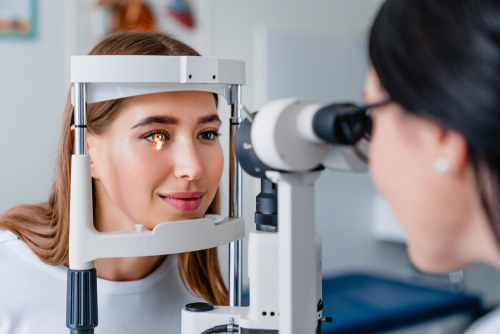How Often Do I Need to See My Eye Care Professional?

Regular eye exams play a crucial role in detecting and preventing serious eye conditions. These exams can enable early identification of eye conditions like glaucoma, cataracts, and macular degeneration, allowing timely intervention and treatment.
Early detection helps preserve vision and ensures better outcomes for long-term eye health. Keep reading to learn how often you need to see your eye doctor!
What is the Recommended Frequency For Eye Exams?
The recommended frequency of eye exams will vary for each person. Your eye doctor at Berg Feinfield will help determine how often you will need to come in for an eye exam by weighing various factors, including your age and overall eye health.
Adults should have a comprehensive eye exam every one to two years, especially if they wear glasses or contact lenses. Children should have their first eye exam at six months, followed by another at age three, and regular check-ups before starting school.
Adults over sixty-five or those with certain health conditions may require more frequent exams. Regular eye exams are crucial in detecting and addressing vision issues, eye conditions, and overall eye health, ensuring early intervention and maintaining optimal vision throughout life.
Do I Need to See an Eye Doctor If I Don’t Wear Glasses or Have Any Eye Issues?
Even if you don’t wear glasses or aren’t currently experiencing any eye or vision issues, it is still essential to see your eye care professional regularly. Comprehensive eye exams are not just for identifying vision problems; they also play a crucial role in maintaining overall eye health.
Many eye conditions, such as glaucoma, cataracts, and age-related macular degeneration, develop gradually and often without noticeable symptoms in their early stages. Regular visits to your eye care professional allow them to monitor your eye health, detect potential issues early on, and implement preventive measures to preserve your vision.
Additionally, eye exams can reveal underlying health concerns like diabetes or high blood pressure, as the eyes can offer valuable insights into your overall well-being. Even if your vision seems perfect, routine eye exams are a proactive step in safeguarding your vision.
Remember, prevention is key to maintaining good eye health for years to come.
What Are the Signs That Indicate I Should Schedule an Eye Exam Sooner Than My Regular Check-Up?
If you experience any of the following signs, it’s essential to schedule an eye exam sooner than your regular check-up:
Changes in Vision
Blurriness, double vision, or difficulty focusing on objects may signal refractive errors or other vision issues.
Eye Discomfort or Pain
Persistent eye pain, redness, itching, or irritation could indicate an infection or inflammation.
Flashes of Light or Floaters
The sudden appearance of flashes of light or an increase in floaters might be linked to retinal detachment or other serious conditions.
Headaches and Eye Strain
Frequent headaches and eye strain, especially after reading or using digital devices, may suggest the need for vision correction.
Seeing Halos or Glare
Seeing halos around lights or experiencing glare sensitivity could be symptoms of various eye problems.
Gradual Loss of Peripheral Vision
A gradual loss of peripheral vision may be a sign of glaucoma, a condition that needs early detection and treatment.
Squinting or Closing One Eye
Children or adults squinting or closing one eye to see clearly could indicate vision issues and requires evaluation.
Family History of Eye Conditions
If you have a family history of certain eye conditions, such as glaucoma or macular degeneration, your eye doctor may recommend more frequent eye exams.
Is it time for you to have an eye exam? Schedule an appointment at Berg Feinfield Vision Correction in Beverly Hills, CA, today!








